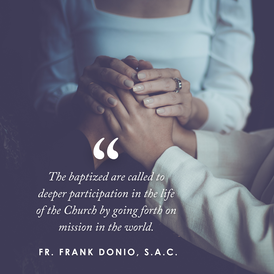 As the Church arrives at the first session of the Synod on Synodality, it is important to look at the three words associated with it – communion, participation, and mission. These are at the center of the dialogue and discernment that will occur. They are part of an ongoing reflection on the role of the baptized in the life of the Church, particularly from the Second Vatican Council onward. We are in communion with the Most Holy Trinity and each other in the Body of Christ, the Church. The baptized are called to deeper participation in the life of the Church by going forth on mission in the world. Each is co-responsible for the mission of Christ and the Church. As Pope Francis notes, “The Synod has three key words: communion, participation, and mission. Communion and mission are theological terms describing the mystery of the Church… Participation is a requirement of the faith received in baptism” (Address for the Opening of the Synod). The whole synodal process is a discernment in the Holy Spirit to examine how we as Church are on mission in the world. Have we closed ourselves off by becoming self-referential or are we moving outward as witnesses of Christ? Pope Francis is clear about what this discernment of the Synod is and is not. “I want to say again that the Synod is not a parliament or an opinion poll; the Synod is an ecclesial event and its protagonist is the Holy Spirit. If the Spirit is not present, there will be no Synod” (Address for the Opening of the Synod). We at Catholic Apostolate Center offer many resources to learn more about the upcoming first session of the Synod of Synodality, which will begin on October 4th and continue throughout the month, including a recent episode of our podcast, On Mission, with Dr. Susan Timoney, Associate Dean for Graduate Ministerial Studies in the School of Theology and Religious Studies at The Catholic University of America. Dr. Timoney gives an overview of the synodal process thus far and what is to come. It is worth taking the time to listen! Please keep all those involved in the Synod in your prayers. May the Charity of Christ urge us on! In God, the Infinite Love, Fr. Frank
0 Comments
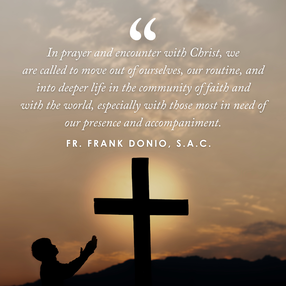 “When we become creatures of habit and grow bored, and the mission becomes a ‘job’, it is time to open our hearts to that second call of Jesus, for he never stops calling us. He calls us to make us set out; he calls us to remake us. Do not be afraid of this second call of Jesus.” - Pope Francis, Homily for Vespers with Bishops, Priests, Deacons, Consecrated Persons, Seminarians, and Pastoral Workers, World Youth Day, Lisbon, Portugal, August 2, 2023 Many people who read our newsletter engage in some type of ministry within the Church, full-time or part-time. Others engage in various types of apostolic work. All are serving the mission of Christ and the Church, each in the way in which they are called. Sometimes, as Pope Francis points out, “mission becomes a ‘job.’” We may need to recognize a “second call of Jesus.” He calls us to himself most profoundly in the Eucharist, whether at Mass or in adoration. In prayer and encounter with Christ, we are called to move out of ourselves, our routine, and into deeper life in the community of faith and with the world, especially with those most in need of our presence and accompaniment. Each of the reflections below given by seven bishops, including the President of the United States Conference of Catholic Bishops, Archbishop Timothy Broglio of the Archdiocese for the Military Services, is not simply for the time of World Youth Day. They are quite relevant to all on mission for Christ as we commit ourselves daily to living for him. We invite you to listen to them as part of your time of prayer or as you journey to others on mission. May the Charity of Christ urge us on! In Christ, Apostle of the Eternal Father, Fr. Frank 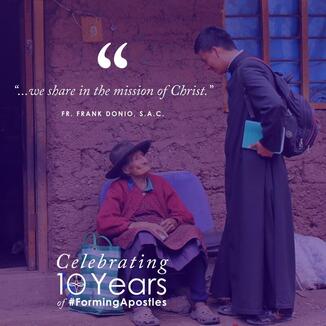 “Each of us – let’s not forget this – has a mission to accomplish. So, let’s not be afraid to ask the Lord: what should I do? Let us ask him this question repeatedly.” – Pope Francis, Angelus, December 12, 2021 What is our mission in life? As Christians, it is obvious, we share in the mission of Christ. That is easy to say, but a challenge to do. What Pope Francis proposes is important, especially about asking the question “repeatedly.” Sometimes we might think that discernment of how we live the mission is something done once or occasionally. Instead, it is a day-to-day discernment and sometimes even moment by moment. “What should I do, Lord?” Consider the question now, then ask it again and again. This deeper portion of Advent, on the cusp of Christmas, provides a perfect time to reflect on what we should do for Christ, with Christ, and in Christ to accomplish well our particular mission. We are not alone in this mission, we might have a unique way to go about it, but the mission is Christ’s. Our sisters and brothers in the community of faith that we call the Church live this mission as well. Let us pray for and support one another as we discern and then live what we should do for the Lord each day. May the Charity of Christ urge us on! May you have a blessed Christmas. Our prayers are with you. In God, the Infinite Love, Fr. Frank As the Church prepares to celebrate World Mission Sunday, we invite you to read this post from Sister Mary Altar of Sacrifice about her missionary vocation. When I was in seventh grade, about the age of 12, I decided to plan my life. I thought that I urgently needed to have an idea and start preparing for my future. I decided that I would be a missionary. I wanted to go to Africa and care for the children, especially those in most need. I always desired to adopt many children, including many with different disabilities. However, the missing piece of my life puzzle was that I didn’t even know what “being a missionary” really meant, and I had never thought about how my vocation would fit into my life either. As time went on, I realized that it was true that I loved to be around and work with children, and I had a great desire in my heart to go out to the whole world to help those in most need. However, I also discovered that God had a very special calling and plan for me, to use me as His instrument. As Mother Teresa said, “I am a little pencil in God’s hands. He does the thinking, He does the writing. He does everything and sometimes it’s hard because it is a broken pencil and He has to sharpen it a little more.” My name is Sister Mary Altar of Sacrifice, and I grew up in Kansas City, Kansas and went to Catholic school my whole life, from kindergarten through college. Thanks be to God, I was given a Catholic upbringing not only at school but also at home. Although I have a truly bad memory, I distinctly remember the different moments of the sacraments in my life, and I believe that it was the grace of the sacraments that opened my heart and led me to discover my religious and missionary vocation. Preparing for First Communion, I remember arguing with my mom about not wanting to wear the fancy white dress. I really disliked dresses because I was a tomboy who grew up with 3 older brothers. However, I understood the importance of the sacrament and was so excited to receive Jesus that I knew that I had to look my very best! It wasn’t until I was preparing for the sacrament of Confirmation that I began to take my Catholic faith seriously and hold it as my own. Our religion teacher told us “this is the moment (Confirmation) that you become an adult in the Church and have to take your faith as your own, so you must decide what you will do with it!” After that, I continually got more involved in the Church throughout high school by joining the youth group, aiding with junior high youth group, lectoring, being a Eucharistic Minister, leading retreats, frequenting the sacraments of confession and communion, etc. I also had the opportunity to do a 2-week mission trip to Peru, which confirmed my early desire to do mission work abroad. The experience of leaving all behind to go serve another was exciting and invigorating. I could concretely see that these people materially were poorer than I, but to see the richness of the treasure of their faith was enlightening. Finally, the time came for me to decide which college I would go to. I decided instead that I would do a gap year of service in another country, but my parents had other plans for me, so my “missionary adventure” was put on hold. Thanks be to God, I decided to go to Benedictine College, where I fell even more in love with Jesus and my Catholic faith, discovered my religious vocation, and finished my degrees in Elementary and Special Education. A month after graduation, I entered the convent in Washington D.C. with the Servants of the Lord and the Virgin of Matara, a missionary order founded in Argentina and currently in over 40 countries. When I visited them for the first time during college, there was a moment of actual grace that I understood this is where God was calling me to fulfill my vocation, and here, He would fulfill all the desires of my heart. I could see the puzzle pieces all fit perfectly together. Now, I am currently a missionary in Papua New Guinea in Oceania and have been here for just over a year. My main apostolate (or missionary work) is in the Primary School of our parish, teaching and working to bring a higher level of integral education to our students. Since I have entered religious life, every day has been a “missionary adventure.” However, being a missionary doesn’t just mean going to another country. Through our Baptism, we have been called to follow Jesus and sent to be missionaries to the world. The first step is to evangelize ourselves. We must look at our life and ask, “am I truly living the Gospel in my daily life and following Jesus in everything I think, say, and do?” Then, we must complete Christ’s mandate to love our neighbors and bring the Gospel to those closest to us. Sometimes, this is even more challenging than leaving our own family and country to serve someone. We must learn to be missionaries in our daily lives and pray and discern to see where and how God is calling us to fulfill that mission. Some have a special calling to give their whole lives as priests or religious to do this work! In addition, God calls some—priests, religious, and laity—to be missionaries abroad. However, we, as Catholics, are all called to be missionaries. As St. Catherine of Siena said, “If you are who you were meant to be, you will set the world on fire!” So, I invite you to pray for the missions and all missionaries in the world in a special way during this month of missions, but also I invite you to take some time to listen and pray about how God is calling you to be a missionary in your life. For more resources on Vocational Discernment, please click here. **This post was originally published on 11/3/2020. AuthorSister Mary Altar of Sacrifice serves as a religious missionary in the Diocese of Vanimo, Papua New Guinea
On Pentecost we celebrate the gifting of the Holy Spirit to the Apostles in the Upper Room. For nine days past they have been hiding in fear, awaiting this gift, the Advocate. The Holy Spirit descends upon the Church in an outpouring of love, and with Mary as their guide, the disciple’s mission begins: proclaiming the Kingdom, outpouring their gifts, and healing the world.
The Apostles were filled with fear up to this point. They had witnessed the Risen Lord’s Ascension into Heaven, and still their purpose was not yet realized. The liturgical calendar enables the faithful to reflect on our own lives, hearts, and mission. We are called to place ourselves in the very heart of the story, to participate as if this very event is happening today. And so Pentecost beckons the questions: “In what ways am I in the Upper Room, unsure of how the Lord is calling me to serve?” “What brings my heart to fear?” “In what ways am I holding onto lies, listening to a voice that is not the Lord’s?” Jesus Christ chose men and women who, like you and me, struggled with human fears, human sin, and human misunderstanding. We can resonate with their experience in the Upper Room, awaiting guidance and courage. The moment the Holy Spirit descends on those in the Upper Room, everything changes and their hearts are transformed. The Apostles baptized 3,000 people that very day. The mission of the Church begins, and the Apostles are equipped with what is needed to live out that mission. From Pentecost onward, the Gospel was shared and people were baptized from as far as India to Spain; miracles and healings took place in Jesus’ name! Now in 2021, we have the same Spirit, and this brings our hearts great hope. This is the very Spirit given to us in our Baptism and Confirmation! We have the power to spread the love and message of Jesus’ life and Resurrection to others because we are equipped with all that is necessary. It is easy to read of the Early Christians who bravely faced martyrdom and changed the world and to just dismiss it, as if the Spirit within them has diminished over time and no longer carries the same power. No, the call of the Christian is to open our hearts to this very same Spirit and ask Him to show us the path to love. The same Spirit that transformed the world through the Apostles can transform our world today. In our ordinary lives there can be extraordinary love, sacrifice, and renewal in and through the power of the Holy Spirit. Today we are called to open our hearts to the Holy Spirit’s transformative love, asking Him to show us the path to mission. In what ways is He calling you outside of yourself to love those around you? How can you let go of fear and open your heart to the burning fire of His love for you and the whole world? “For God did not give us a spirit of timidity but a spirit of power and love and self-control.” 2 Timothy 1:7 “In the name of the Father, the Son and the Holy Spirit.” This is how I begin all of my prayers; and it comes from a long tradition in Christianity. As Catholics, we usually accompany these words by making the Sign of the Cross with our hand. Why is this so important to our faith and to me personally? To begin, I suggest revisiting and praying the Nicene Creed as it is proclaimed at every Catholic Mass. This is our profession of faith. The Holy Trinity – three persons in one – is a mystery we mere mortals can scarcely understand, but it explains our identity as children of God. We are taught from the Old Testament that God the Father is the Creator, and He sustains all of the world. In the New Testament we are instructed that God the Son is our Savior, Jesus Christ – both divine and human in nature and whose behavior we strive to model. At Pentecost, as told in the Acts of the Apostles in the New Testament, we are shown that the Holy Spirit is imparted to each of us as the presence of God in us who gives us wisdom and boldness to act as we are taught by Jesus. The unity of these three divine beings in one God is a profound gift I believe in complete faith, and it helps me understand who I am in His Kingdom. I am a child of the Father who loved me into being together with my earthly mom and dad, I am redeemed by the body and blood poured out by Jesus His Son for all my failings, and I am aided constantly by the Holy Spirit to live and profess the Christian life in joy and exuberance! I like to think of myself as being a flesh and bone human with supernatural assistance (as long as I cooperate with the will of God)! That is a pretty amazing disposition to live out of. We read in the Old Testament’s books of the prophets that God promised a Messiah to save His people, and then in Matthew 1:2-16 the genealogy of Jesus is recorded and spiritually comes to include each of us, who through our baptism become sons and daughters of God. This is an earthly and divine bond like no other in all of creation. There is so much more to us human beings than our earthly bodies and this temporary space we inhabit. We are walking, talking, living, breathing messengers of God the Almighty, commissioned to share love and mercy to every other living being around us. We are flesh and bone, but we are also spirit and intellect. When in right relationship with our Lord, we are the dwelling place for God to move and work in and through us. Understanding our identity and praying for guidance to live it out in what we do and say is imperative to being a member of the Kingdom of Heaven. This knowledge and the grace and virtues that flow from accepting our mission gives us the power to bring life and healing and hope and joy to a hurting, confused, and broken world. So, if you are ready to accept the mission, be prepared to be filled to overflowing with the Holy Spirit and be equipped with all that is necessary to be a present day apostle! Several years ago, one of our young sons made a simple but beautiful bookmark for my husband as a gift. It was brightly colored and had the words: WORK FOR GOD! down the middle. This summarizes exactly what we are called to do and continues to be a great reminder as it sits in my husband’s Bible. The Holy Trinity is the foundation of all our Christian beliefs and it gives me great comfort knowing who I come from and who I belong to for time and eternity, even when I do not fully comprehend it. We can sing from the rooftops: “Holy Father, Holy Son, Holy Spirit, three we name Thee; while in essence only one, undivided God we claim Thee; and adoring bend the knee, while we own the mystery” (Holy God, We Praise Thy Name by Ignace Franz). To learn more about living as a missionary disciple, please click here. 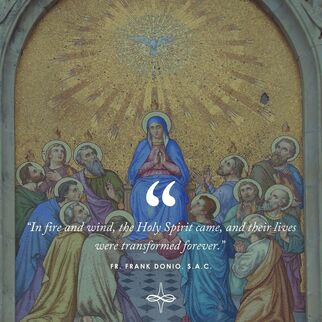 We are in the time of the Upper Room, the Cenacle. The days between the Ascension of the Lord and Pentecost are liturgically the time when the Blessed Virgin Mary, the Apostles, and the disciples were together in prayer, awaiting the coming of the Holy Spirit. They did not really know what to expect. In fire and wind, the Holy Spirit came, and their lives were transformed forever. The world is also transformed and is transforming. The mission continues in the name of Jesus Christ! We are sent as apostles, as missionary disciples, out into the world. Hiding in a room, in our homes, even in a church is not our call. Instead, we go forth, going where the Holy Spirit moves us to go. We can do amazing things in the name of Jesus Christ. There is no need to wait until someone invites us. No, if we are baptized, and especially if we are confirmed, then we can go forth! We need to recognize, though, that we do not send ourselves. We are sent by Christ, in and through his Church. The community of faith that we call Church is where we go forth from and to which we return. The Church teaches us, forms us, heals and nourishes us through the Sacraments, and sends us on mission. The mission is not ours; it is Christ’s. We, as members of Christ’s Faithful, are called to live his mission until he comes again, just as the Apostles were told to do. In all of this, Mary, Queen of Apostles, is with us as our Mother and Queen. Her feast day is the day before Pentecost. She was the perfect disciple of Christ. St. Vincent Pallotti said of her: “We have most holy Mary, after Jesus Christ, the most perfect model of true apostolic zeal, and of perfect love” (OOCC I, 7). The Decree on the Apostolate of the Laity of the Second Vatican Council echoes this sentiment of Pallotti: “The perfect example of this type of spiritual and apostolic life is the most Blessed Virgin Mary, Queen of Apostles, who while leading the life common to all here on earth, one filled with family concerns and labors, was always intimately united with her Son and in an entirely unique way cooperated in the work of the Savior… All should devoutly venerate her and commend their life and apostolate to her maternal care” (4). Mary, Queen of Apostles, pray for us! May the charity of Christ urge us on! To learn more about Mary, Queen of Apostles, please click here.
“Why are you standing there?” The angels who spoke these words to the astounded disciples now turn to ask us this question today. Perhaps, like the disciples after the Ascension, we too have been stuck looking up at the sky, wondering where Christ is. Our answers to the angels’ question are probably very legitimate. “I am standing here because of the pandemic, because I lost my job, because of isolation, because of sickness, because of racial discord, because of people’s differences, because I don’t know what else to do.” In this passage from today’s Gospel reading, which is the same as this upcoming Sunday’s, I remind myself that at least the disciples were looking up. They at least had their eyes fixed on Christ. That, in and of itself, is a good thing. But what God wants to convey through the angels after Jesus’ Ascension is that just seeing Christ or believing in him is not enough. A relationship with Christ results not in paralysis, but in action. “You will be my witnesses,” Jesus tells his disciples moments before he ascends to the Father. And it is by living out our relationship with Christ as witnesses that the world comes to know him and that our faith comes alive. Witnessing to our faith and accompanying others on their faith journeys shake us out of our paralysis and help us overcome our fear. Jesus is not conveying that hardship, suffering, or unrest will be absent from our lives, but that these no longer have the power to paralyze and trap us. His Resurrection has changed the narrative. And as the Easter season comes to a close, Jesus is calling us not only to believe in him, but to act— to have our lives transformed by the knowledge of the Resurrection and to live boldly and faithfully as a result. At this point, however, the disciples are still focused on earthly things. Just before Jesus’ Ascension, they ask him, “Lord, are you at this time going to restore the kingdom to Israel?” Many of us have similar questions. “Lord, at this time will I get my job promotion? As this time, will my addiction be healed? At this time, will the pandemic end? At this time, will our family be reconciled?” These are valid, important questions of the human heart. Questions that long for answers, for resolutions, for miracles. Jesus’ response seems mystifying and even unrelated: “You will receive power when the Holy Spirit comes upon you, and you will be my witnesses.” While the disciples are still caught focusing on the restoration of Israel and victory over their oppressors, Christ promises more. So much more, in fact, that they are unable to grasp it without the gift of the Holy Spirit, whose coming we celebrate on the Feast of Pentecost on May 23rd. It is why Jesus chose to ascend at this time. He had spent 40 days teaching and opening the Scriptures to his disciples after his Resurrection, but they still could only fathom human goals and objectives. Jesus knows his ministry has come to an end and that a new chapter of the Church will begin with the promised Advocate, the Holy Spirit. After he answers them, Jesus compels his disciples to look up to the heavens as he begins to ascend to the Father. He is physically showing them the needed disposition of their hearts and minds in order to receive the Holy Spirit: they should be considering heavenly things and a heavenly goal. But then, moments later, they are startled to hear: “Why are you standing there looking at the sky?” It can be tempting at times to separate ourselves from the reality of the here and now by over-spiritualizing things or being preoccupied with the past or future. The disciples are left looking up (very understandably), but this looking up and clinging to Jesus in his physical form distracts them from the action to which he has called and chosen them: to be his witnesses to the ends of the earth. This balance between living in the world but not of it can be difficult to grasp and practice. It’s important first to consider where you find yourself today. Are you asking the Lord to restore the kingdom to Israel? Are you standing looking at the sky? Many of us are somewhere in between. Below are 6 practices that help ground me in Christ and deepen my ability to witness to his love:
By considering these practices, it is my hope that, renewed by the Holy Spirit at Pentecost, we will enter into Ordinary Time ready to be Christ’s witnesses to the ends of the earth. Christ calls us each to so much more than simply remain standing. For more resources on living as missionary disciples, please click here. Have you ever evangelized in the streets? St. Vincent Pallotti did in the Rome of his day. He would go to a piazza and begin preaching. People would gather around. Some priests even judged him for engaging in this type of evangelization because they considered it beneath his dignity as a priest. However, he knew that many people did not come to church. Pallotti believed that the Church needed to go to people and not wait for people to come to church. These truths hold firm today. This is the call of all the baptized. We are sent by Christ into the world to preach his Gospel by word and deed – to be his witness in the world as his apostles or missionary disciples. Pallotti wanted to preach not only to those who did not believe, but also to Catholics in order to revive their faith. It may seem strange to evangelize in the streets, but in my hometown of Hammonton, New Jersey, Catholics have been doing so for 145 years. Every year, Catholics in the community have participated in an annual procession through the streets of the town in honor of the Blessed Virgin Mary under the title of Our Lady of Mt. Carmel, whose feast day is today. This is a very public display of faith that spills out from the church building and into the streets—mirroring the work of Pallotti. We are told “Go” at the end of Mass, but go and do what? Go into the streets, not only the literal ones, but also the ones online. We are moved outward by Christ. Our faith in Jesus Christ and our experience of his infinite love and mercy is not our private matter. Nor is it ours to decide the quality of another’s life of faith. Our mission is to witness Christ to all we encounter and accompany them into an encounter with him, in and through the community of faith, the Church. Through good accompaniment, sincere community, and deeper conversion, all can come to know that they are sent by Christ. May the charity of Christ urge us on! When I was a senior in high school in the diocese of Joliet, then-Bishop Peter Sartain came to celebrate one of our monthly school Masses. I was asked to assist the Bishop for the day, and throughout the day he and I had many warm conversations. I received a piece of mail a few weeks later from Bishop (now Archbishop) Sartain containing a handwritten note and several prayer cards with Blessed Pier Giorgio Frassati’s image on them. Little did I know that the young Blessed would soon become one of my dear patron saints. In my opinion, anyone who offers their life as an apostle on mission—including lay and ordained ministers, Catholic school employees, catechists, and all spiritual guides—should keep Blessed Pier Giorgio Frassati as their patron saint and their example to combat despair and to joyfully share the Gospel. Blessed Pier Giorgio shows us the Christ-like demeanor and personality that the Church and her ministers and missionaries should possess as they evangelize the world. Blessed Pier Giorgio makes an excellent spiritual guide and mentor because he was an ordinary young man with a profound commitment to the poor and to justice. There are countless books and articles that describe how Pier Giorgio spent hours serving the poor and the homeless, often giving away the money he had for bus fare and even his own jacket! His parents misunderstood his great actions of charity, and often scolded him when he returned home late without his coat. He was never distracted from the missionary imperative of the Gospel. Instead, he served those on the margins as Jesus commanded. Archbishop Wilton Gregory of Washington D.C. recently stated in a webinar, “The Church lives in society. The Church does not live behind the four [walls] of the structures where we worship.” Just as Pier Giorgio Frassati befriended the poor and sought justice as a “man of the beatitudes,” we too must go beyond the four walls of our churches, homes, and offices into the margins of our society to serve our brothers and sisters and work for justice. Blessed Pier Giorgio also accompanied others in their pursuit of God. He maintained unlikely friendships and was neither bound up by cynicism nor weighed down by scandal. Instead, he actively worked against these in his interactions with all. Many stories detail his love for pranks, making bets with his friends over games and making the stakes be attending Mass or Adoration. Like this soon-to-be-saint, we must live in the world while encouraging others to return to Christ in the spirit of friendship. As apostles on mission, we must live, work, and play with a renewed spiritual vision, driven by the practice of spiritual accompaniment. The quality I most admire in Blessed Pier Giorgio is his ultimate trust in God’s plans. He did not try to take control of his life’s plan nor did he envy God’s authority. Rather, he allowed God to guide him as he discerned his future and his mission in life. Pier Giorgio brought Church doctrine to life through his service and actions. He lived with a gospel-inspired freedom. He spent time in deep prayer, contemplating the mission God had laid before him, discerning to serve the poor as a lay man with expertise in mechanical engineering rather than as a priest. Pier Giorgio trusted God. As Alfonso Nebreda, S.J. wrote, “We must not forget that man cannot nourish his spirituality with orthodoxy alone … there is more to Christianity than this … for faith is life” (Kerygma in Crisis?, Nebreda). Blessed Pier Giorgio embodied the Gospel, and he lived it out according to his mission from God. As we consider the life of Blessed Pier Giorgio Frassati, I invite those who serve the Church as lay or ordained ministers, catechists, educators, and spiritual guides to adopt this young saint as a guide for our spiritual lives and our ecclesial missions. Let us invite the same Spirit who lived in Blessed Pier Giorgio and who makes the Church vibrant to renew our hearts, minds, and missionary efforts. Blessed Pier Giorgio, pray for us! Interested in learning more about becoming an apostle on mission? Click here to learn more. If you’re used to communicating with others via text message, then you’ve probably, at some point, received a message and interpreted it out of context. A curt reply with a period at the end could be misinterpreted as either passive aggressive or as an irritated response. This happens to me occasionally, and I always have to remember that without hearing a person’s message verbally, it can be difficult to understand what they’re really saying or implying. Maya Angelou’s quote rings true here: “Words mean more than what is set down on paper. It takes the human voice to infuse them with deeper meaning.” Our voices add a unique depth and fullness to our communications by revealing emotions, nuances, and subtle meanings more sharply than words alone can communicate. On this feast of the Nativity of St. John the Baptist, I am struck by St. Augustine’s words from this morning's Office of Readings: “Today we remember that Zechariah’s ‘tongue is loosed because a voice is born.’” St. John the Baptist was born to be the final prophetic voice who proclaimed the Word made flesh. Like the Old Testament prophets, John foretells the coming of the Messiah and calls sinners to repentance with words that cut to the heart (Luke 3:1-29). But, unlike the Old Testament prophets, John identifies the Messiah for the first time in salvation history. John points Jesus out and encourages his followers to pursue him (John 1:29-37). He is confident that his cousin is the foretold Christ, and by his proclamation John fulfills the mission of all the prophets as he straddles the boundary of the Old and New Testament. John’s historical mission of giving voice to the Word is also our mission. At our baptism, we were anointed as a priest, prophet, and king. We share uniquely in Jesus’s ministry, and we are called to be lay prophets who proclaim the good news of repentance and redemption. We must, like John the Baptist, spend time coming to know the promises of the Messiah so that we can recognize Him when we see him. And when we see Him present in the sacraments, or when we encounter Him as we are accompanied by a spiritual mentor, or when we experience Him through the fullness of our prayer, we must point Him out for all to see. To fulfill our baptismal call to be prophets of the Gospel of Christ, we must give voice to our experiences of God. John’s words must be our words to the world, “Behold, the Lamb of God.” 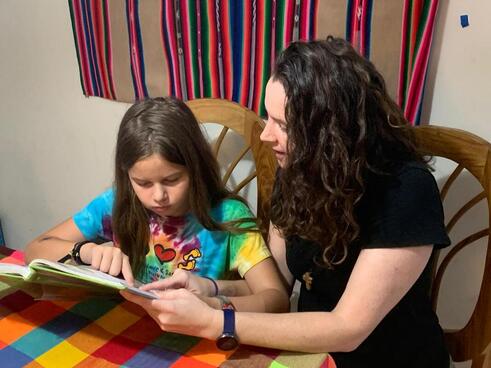 Like most of you, my family and I have been in quarantine. When El Salvador’s President Nayib Bukele first announced the prospect of a quarantine—before there were any confirmed cases here—our family decided that it would be best to practice physical distancing right away. The public hospital system here in El Salvador is precarious under normal circumstances, and once the virus is at its peak, it won’t matter how much money you have. If you require a hospital bed, you will go where there is one available. The national convention center in San Salvador is being converted into a 3,000-bed hospital, with 1,000 of those beds designated for intensive-care patients. Our best bet for surviving this pandemic is to stay home and find ways to continue our relationships with the people at our ministries without being physically present—a challenge, but also an opportunity. My ministry, the women’s cooperative ACOMUJERZA, has come to a screeching halt. We were in the middle of a huge order for the Education Ministry of El Salvador. We are sewing over 3,000 school uniforms as part of a government-funded program. This order is the biggest we have ever been contracted to make, and frankly before this pandemic our members were scrambling to figure out how we were going to sew more than 3,000 pieces in 60 days and how we were going to pay everyone to make all of those uniforms. ACOMUJERZA applied for a loan from a non-governmental organization that has helped us in the past. We received the preliminary approval for the loan, but with all of the economic uncertainty, the NGO froze all lending for the foreseeable future. ACOMUJERZA members packed up all of the finished uniforms and prepared the building for the beginning of a nationwide mandatory quarantine on Saturday, March 21. There is so much uncertainty, and yet when I talk to each of our members, they remain positive. The government has promised a government grant of $300 a month to unsalaried workers—those most in need, which applies to some of our members—but that money has not been distributed yet. With 12 days into our quarantine, I worry about how my friends at the cooperative are surviving and if they have enough food to eat. I spoke with my friend Juanita from the women’s cooperative the other day. She told me that, when she first went home after the president declared quarantine, all she wanted to do was cry. She felt depressed and sad to not be able to go to work and she felt a loss of her freedom. But after a few days, she pulled herself out of her sadness, and she told me about all of the things that she and her daughter decided to do during the mandatory quarantine. They already painted a few rooms in their house, got rid of old clothes, sewed masks and spent time tending to her garden. “Now the time just seems to be going by quickly, thanks be to God.” she said to me during our last phone call. We chatted a bit longer and before getting off the phone, she reminded me that “we are all called to do our part and, for now, our part is staying at home.” While checking over my daughter Evey’s daily journal assignment for school, I realized just how I am doing my part. She was assigned to write about what she liked and didn’t like about being homeschooled during the quarantine. She wrote, “I like homeschooling because it is fun and I get to do more fun stuff with my mom.” Maybe “doing my part” is keeping spirits up among the members of the cooperative, sharing my gifts and talents with Maryknoll Lay Missioners, spending more time with my children and modeling for them how to adjust to an ever-changing reality This blog post was re-published with permission from Maryknoll Lay Missioners. To learn more about their work and mission, please click here. To learn about other faith-based service opportunities, please click here. As I write this, there are currently 2,382 people in my home state of New York who have contracted the Coronavirus, with 21 others having lost their lives in the pandemic. With both of those numbers climbing each day, the feelings of anxiety, helplessness, and despair are palpable— not just in New York, but around the world. Here in New York, I am currently a seminarian on pastoral year (a year-long internship at a parish in my diocese). In an exercise of charity and concern, our diocese like many others has cancelled all Masses, public liturgies, devotions, and meetings through Easter in order to keep our most vulnerable parishioners safe. This has of course posed a certain ministerial crisis since many of the avenues (Mass, confession, one-on-one meetings) that we have been taught to send people down when feeling anxious, despondent, and isolated from God are now closed indefinitely. So, what do we do? This situation is calling us to be creative in how we minister to people. Online resources, social media, live-streaming liturgies, and even just phone calls and video chats can and will keep people feeling connected. I think many of us already know this and have been putting effort into these new ministries and forms of evangelization even before the pandemic. It is true though that without sacraments and personal connection, even this media approach could never be enough. While creative ministry right now is important, I would like to focus rather on the flip side of that same question—what do we do? Here, I would like to address my brother seminarians and anyone, priest and lay alike, that is struggling due to a lack of fulfilling ministry. I don’t think this is a selfish pursuit, but an essential one if we are to check our own feelings of anxiety, helplessness, and despair. Last summer I had the great experience of attending the Institute for Priestly Formation (IPF). In these last few days, one of their spiritual approaches came back to me vividly; they called it Relationship-Identity-Mission—and here the order of the words does matter. IPF posited that many people in ministry may operate backwards. Mission is primary; from there flows Identity (I am a seminarian. I am a youth minister); then, the personal Relationship with Christ gets whatever energy is left. If these last few days without “real ministry” have been a struggle for you, as they have been for me, I think we need to ask ourselves not “what do I do?”—because frankly we cannot do much of anything our Mission truly requires—but rather ask “who am I? I work for Jesus, yes, but is my own, personal relationship with Him primary?” In discussing Relationship-Identity-Mission, the question was often asked “where do you live?” If you live in your Mission and your Identity is synonymous with what you do, you are going to have a difficult month (or maybe even longer). But if you live in the Relationship and make that your starting point, even during a time when the Mission is unclear or nonexistent, then you are going to rediscover your Identity as a beloved son or daughter of a faithful God. Amidst fear and uncertainty, God is giving us this time to go deeper into a relationship with Him, so that we can live out our missions more fruitfully when this is all over. So, if you find you are struggling now because you are living Mission-Identity- Relationship, take his time as a Lenten Retreat and don’t feel bad about it! The world needs your prayers now more than ever, and your creative approach to ministry now will then be the fruit of your time alone with Jesus. If you are living Relationship-Identity-Mission, go deeper and speak honestly with Jesus about frustrations with your minimized Mission. In closing, I would like to offer this consoling quote from Henri Nouwen for your reflection: “We are not what we do, we are not what we have, we are not what others think of us. Coming home is claiming the truth. I am the beloved child of a loving creator.” Jesus is calling us to remain in His Love (John 15:9), a request that I imagine was made for times like these. So choose to live in the relationship, take ownership of your identity as the beloved, and watch your ministry take root. Click here to visit our COVID-19 Resource Page
"What about you? What are you going to do?" These are the words of Pope Leo XIII to St. Katharine Drexel, whose feast day we celebrate today, when she spoke to him of the needs of the missions in Wyoming. The Holy Father’s response stopped Sister Katharine in her tracks, but it also made her reconsider how she approached her life of faith. Sister Katharine returned to the United States and went on to found over fifty missions for Native Americans, a system of schools for Black Catholics, and various other mission centers and schools. Every day, Christ poses to us a question similar to the one Pope Leo XIII posed to St. Katharine Drexel: “What about you? What are you going to do?” Pope Francis spoke of this encounter when he visited Philadelphia for the World Meeting of Families in 2015. He commented on the fact that St. Katharine was herself young and full of fervor for the Lord and wondered rhetorically how many young people around us have a similar energy and fervor. He asked in his homily at Sts. Peter & Paul Cathedral in Philadelphia “Do we challenge them? Do we make space for them and help them to do their part? To find ways of sharing their enthusiasm and gifts with our communities, above all in works of mercy and concern for others? Do we share our own joy and enthusiasm in serving the Lord?” The Holy Father touched on the call of all of the baptized to be missionary disciples. This call requires us to be open to all that the Holy Spirit may be guiding us to while still carrying forth the legacy of the past. The third major point that the Holy Father addressed was the role of the laity. He said, “We know that the future of the Church in a rapidly changing society will call, and even now calls, for a much more active engagement on the part of the laity.” The Holy Father’s point is that to properly answer the question, “What are you going to do?,” there must be collaboration by and co-responsibility of the lay faithful who work together with the ordained to make manifest the redemptive and salvific nature of the Church of Jesus Christ. The Holy Father then reminds us that this collaboration and co-responsibility is not a game of power and position. He says, “This does not mean relinquishing the spiritual authority with which we have been entrusted; rather, it means discerning and employing wisely the manifold gifts which the Spirit pours out upon the Church.” Each of us have been given different gifts and charisms that build up the Kingdom of God; the Holy Father challenges us to use them. The questions that Pope Leo XIII asked St. Katharine Drexel are the questions of vocation. In both our universal call to holiness that we receive from our baptism and in our particular vocation, we are faced with these questions: “What about you? What are you going to do?” We are not necessarily called to build up schools and mission centers as did St. Katharine, but to answer these questions we must be willing to be open to where the Spirit is guiding us, to see how our gifts and talents can be best utilized for the Kingdom and to answer our call to be “leaven of the Gospel in our world.” For more resources on missionary discipleship, please click here. For more resources on collaboration and co-responsibility, please click here. I lead the Catholic Volunteer Network (CVN) – but am not Catholic. My journey to this unique place has not been overnight or accidental. It comes from years of commitment to unity.
CVN is the leading faith-based service organization fostering full-time, faith-based lay mission service. Our membership consists of 155 Christian volunteer programs serving throughout the U.S. and in over 100 countries. In any given year, up to twenty percent of our programs may be identified as Protestant. In addition, volunteers who serve in CVN programs range from cradle-Catholics to spiritual seekers. Recently, the CVN Board of Directors affirmed the importance of witnessing to our identity as Catholic and ecumenical. This approach works because, to a great degree, both CVN programs and volunteers respect each other’s identities and goals. As they learn about each other via extensive application processes, a relationship of understanding and trust begins. The result is clarity about needs and expectations, and in many cases a willingness to engage with “the other” for a significant amount of time. When a year-long volunteer community is ecumenical, learning that enhances and transcends that experience can transpire. CVN thinks that is good—that faith and mission throughout life in a complicated world requires an openness to understand other approaches to faith, community, and service. Openness to different experiences put me on a path of fostering Christian unity. Therefore, when a role with CVN became a possibility, I was drawn to it not despite it being Catholic – but because it is Catholic. I wanted to be part of a network discerning how a commitment to Jesus Christ unites us and enhances witness to his Gospel in the world. But I did not get to that place without a mixture of providence and intention. Years ago, I was the Director of Public Policy for Call to Renewal (CTR), a diverse network of national churches and faith-based organizations united to overcome poverty. CTR’s vision was that Christians from across the theological spectrum working together could inspire other Christians to foster relationships across denominational affiliations, as well as inspire political leaders to work together across the aisle. It was an attempt to break down the divides created by labels such as liberal and conservative, and to honor a range of anti-poverty strategies often considered to be at odds with each other (e.g. strengthening families and supporting government programs). Members of CTR included Protestants, Evangelicals, Catholics, Peace Churches, and more. National leaders from these churches agreed that progress could be made to reduce domestic poverty if they chose not to allow theological and doctrinal differences on other matters to prevent collaboration. Because of this, many Christian leaders met counterparts for the first time and nurtured relationships grounded in openness and a willingness to learn. Many found a new respect for different approaches to faith, as well as different views on how to reduce poverty. That experience and others broadened my theological and political perspectives. Since then, I have sought to build relationships and bridges. I still have convictions and disagree with others, but am less likely to judge quickly or to shut doors. I am more likely to be curious about how God wants me and others to engage despite differences. Sometimes unity means affirming a shared connection to Christ, getting to know another, and seeing where that leads. Sometimes it is a strategic partnership to pursue change. I just try to witness to what I believe – and pray God can act through me and others. I pray that you, too, find special ways of witnessing to the strength of Christian unity. I pray that openness and experience will transform you. The world needs our example. To learn more about Christian unity, please click here. To learn more about faith-based service opportunities with the Catholic Volunteer Network, please click here. |
Details
Archives
July 2024
Categories
All
|
About |
Media |
© COPYRIGHT 2024 | ALL RIGHTS RESERVED

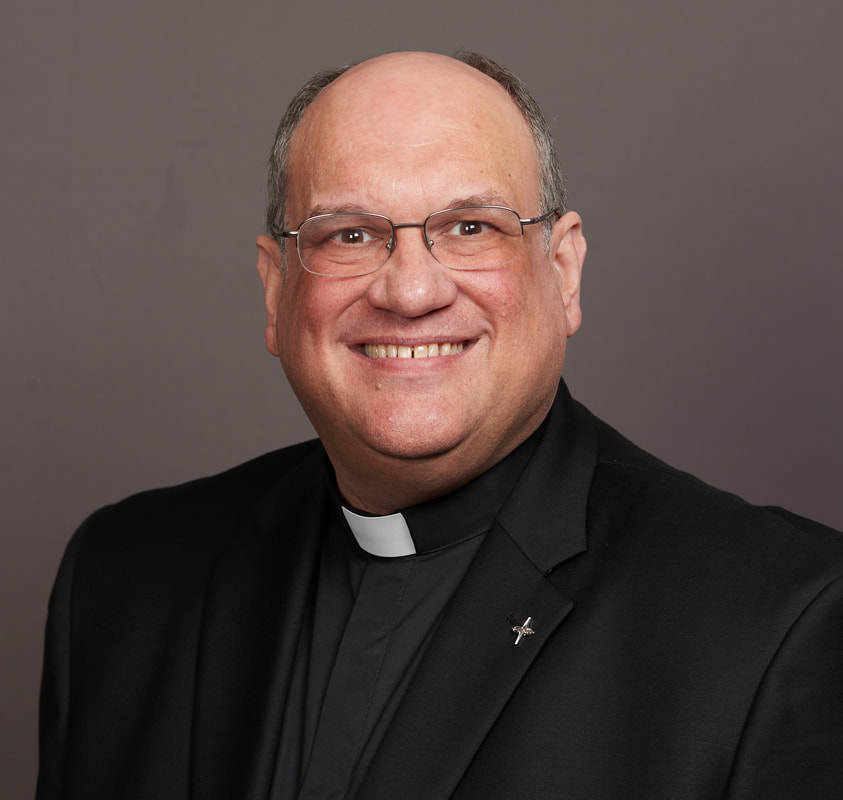
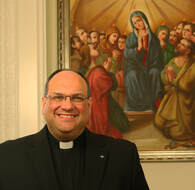
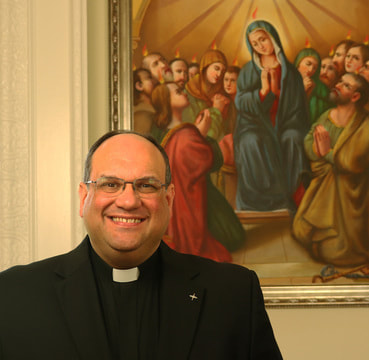
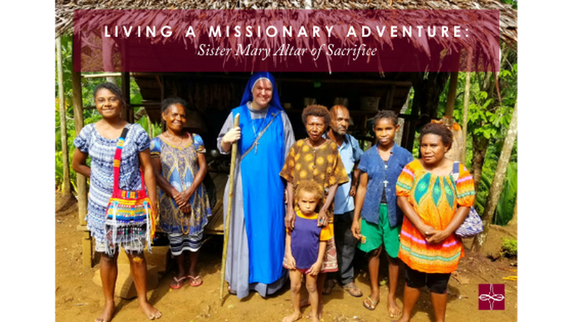
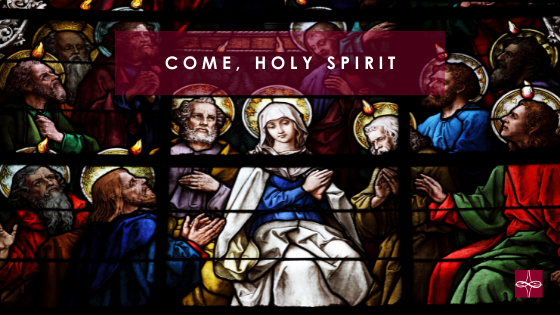

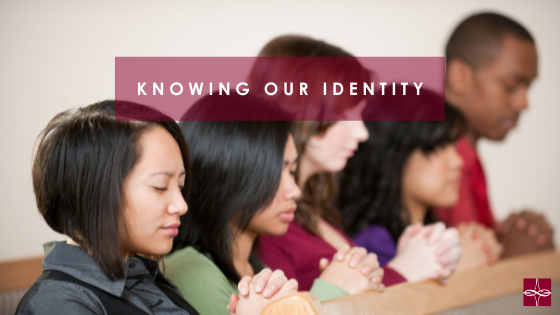

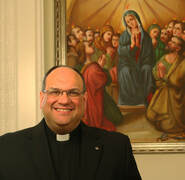
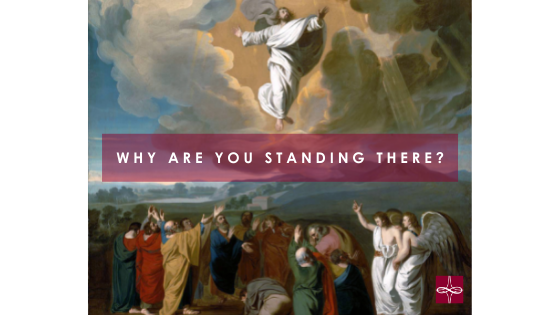

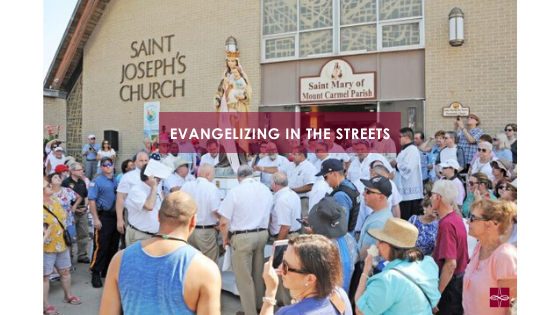
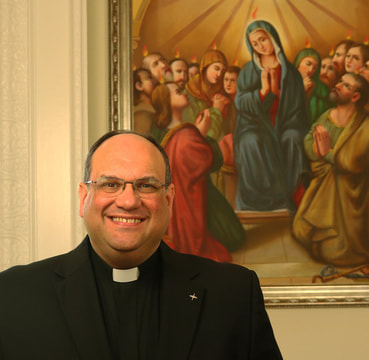
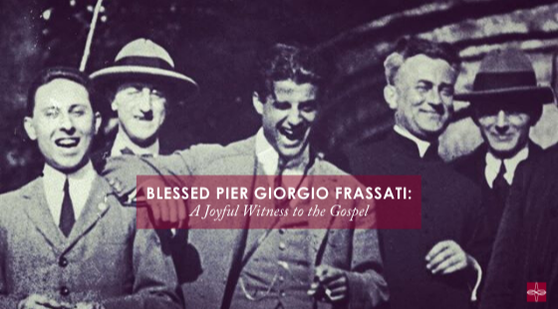

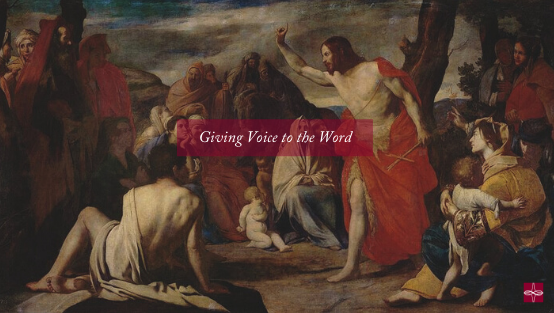

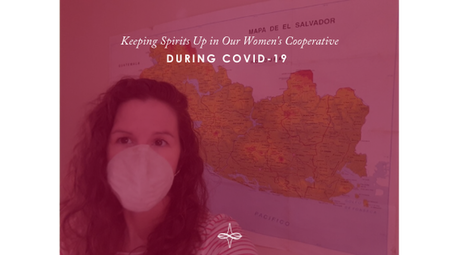

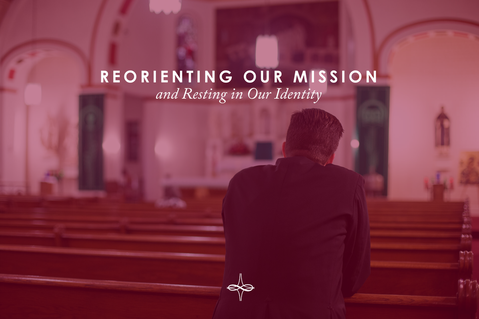
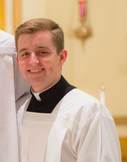

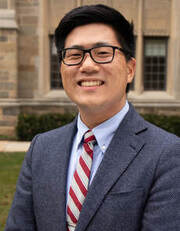
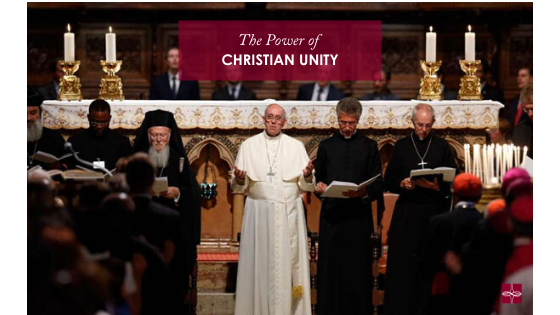

 RSS Feed
RSS Feed